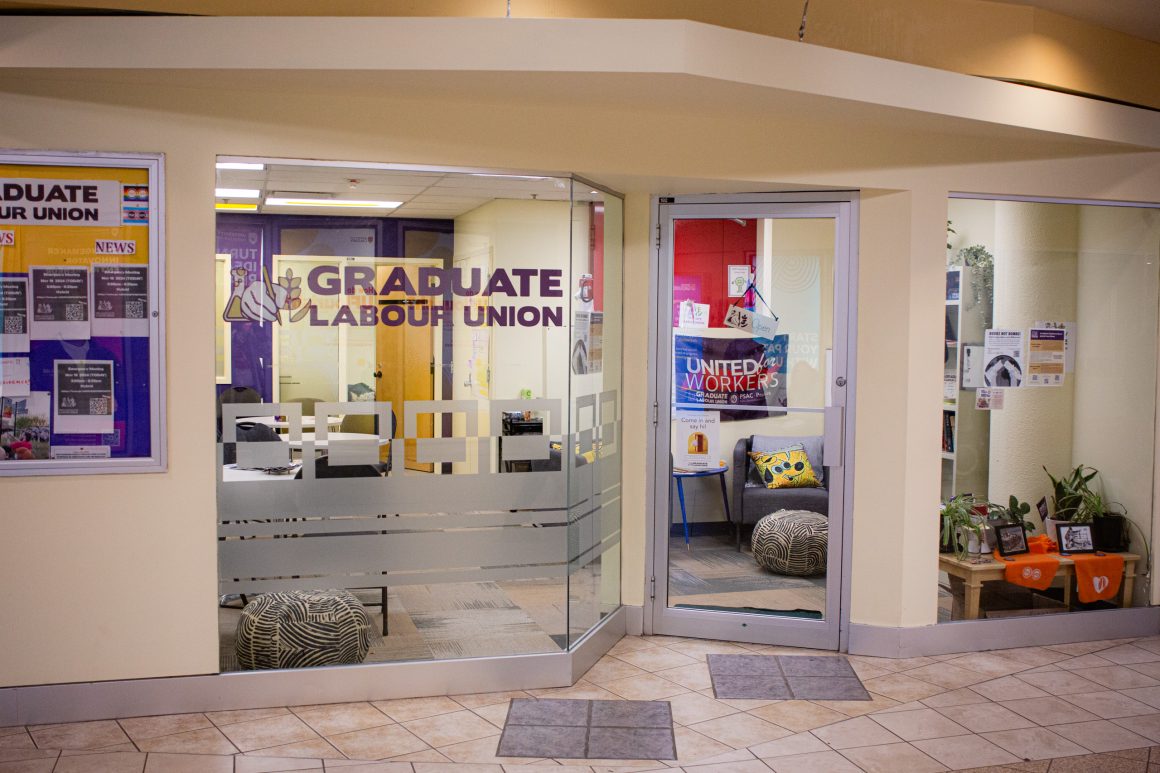
GLU marks almost two years of negotiations, pressures university for fair agreement

By Vama Saini, November 25 2024—
The Graduate Labour Union (GLU) has been engaged in negotiations with the U of C for 23 months, advocating for better wages and improved working conditions for its over 2,000 graduate student members.
Despite ongoing discussions, key issues remain unresolved, leaving the GLU determined to secure a collective agreement that acknowledges the crucial role academically employed graduate students (AEGS) play within the university community.
The university emphasized its commitment to reaching a resolution.
“The university is committed to negotiating in good faith and is hopeful that an agreement can be reached when the parties engage in mediation on Dec. 5 and 6,” read the statement attributable to the University of Calgary.
The GLU’s advocacy efforts are shaped by a unique legislative environment in Alberta. In 2017, provincial legislation established the Graduate Students’ Association (GSA) as the official union, limiting graduate students’ ability to form independent unions. This has caused frustration among the GLU, which represents graduate students employed as teaching assistants, researchers and other academically employed roles.
“We were legislated into the GSA, which has a broader role of student advocacy, not focused on labour relations,” said Joshuah Lockett-Harris, GLU vice chair of outreach. “In Alberta, we’re constrained by the GSA’s broader mandate, making it harder to address specific labour issues.”
This setup has posed a significant barrier in the GLU’s quest for a collective agreement that meets the distinct needs of AEGS.
One of the primary sticking points in negotiations has been the university’s insistence on classifying graduate students as essential workers.
The university explained that discussions around essential services have progressed, following a ruling by the province’s Essential Services Commissioner.
“The Essential Services Commissioner found that there are graduate assistants who perform essential services and dismissed the GSA’s application,” read the statement from the UofC.
The GLU has opposed this designation, which would restrict their ability to strike and complicate grievance procedures.
“The administration is pushing for us to be designated as essential workers, which would severely limit our ability to negotiate. We don’t believe graduate students are providing ‘essential’ services in the same sense,” Lockett-Harris explained.
The university asserts that graduate students are integral to its operations, but the GLU argues their work is not comparable to that of healthcare workers or first responders.
“The university has suggested that 60–70 per cent of departments treat graduate students as essential workers, but that’s simply not the case. We are workers, but we’re not on par with healthcare or frontline staff,” Lockett-Harris said.
The financial hardship faced by graduate students is a key focus of the GLU’s advocacy. Despite working long hours as teaching assistants and researchers, many graduate students live below the poverty line due to low wages and insufficient support.
The university’s minimum guaranteed funding is often inadequate to meet the high cost of living in Calgary, forcing many students to rely on food banks and other forms of financial aid.
“When grad students are offered minimum guaranteed funding, it essentially forces them into poverty,” said Lockett-Harris. “Even with that funding, many students are still struggling to get by.”
A critical issue for the GLU is the short grievance timelines currently in place. Under the collective agreement, grievances must be filed within seven business days, which the GLU argues is too short, especially for vulnerable graduate students who may not be aware of their rights or may not recognize mistreatment in time.
“Imagine you’re a research assistant in a lab, and you experience harassment from your supervisor. How can you process that and file a grievance within seven days?” said GLU Member at Large Allan Lyons. The university acknowledged this concern.
“This item is being reviewed in the current round of collective bargaining and will be discussed by the parties when mediation commences in December,” read the statement.
The GLU is also seeking clearer language in the collective agreement to ensure fair resolution of disputes. GLU Chair and AVP of Labour Karina Hincapié Martinez pointed to the 2017 legislation as an example of how ambiguous terms can be detrimental to students, especially when they rely on the university’s goodwill to resolve issues.
“We need clearer contract language that holds the university accountable,” Martinez emphasized. “The current agreement is vague, which often works in the university’s favour.”
Alongside financial and grievance-related concerns, the GLU is pushing for greater transparency in disciplinary procedures and better job security for graduate students.
“We’ve seen cases where graduate students are disciplined without clear justification,” said Ahmad Wattoo, a member of the GLU bargaining team. “There’s a need for more transparency and a clear system for resolving disputes.”
As mediation continues, frustration among GLU members has reached a boiling point. Many feel the university is not taking their demands seriously due to the prolonged delays in negotiations.
“It feels like they just don’t want to move forward, like they’re stalling us until we give up,” said Lockett-Harris. “We’ve been at this for over 22 months, and it’s exhausting. We just want to feel respected and treated fairly.”
The university highlighted its efforts to resolve the impasse, stating it proposed voluntary mediation several times, but the GSA declined. In September, the university filed for mediation, set for December 5.
Despite ongoing difficulties, the GLU remains hopeful that a resolution will be reached. Both Lockett-Harris and Martinez emphasized the importance of keeping pressure on the university administration while continuing mediation efforts to reach a fair settlement.
“We want this agreement signed as soon as possible,” Lockett-Harris said. “But we won’t compromise on the issues that matter most. We will continue to push for a solution that benefits everyone.”
For the latest updates on the bargaining process, visit the GLU website.
